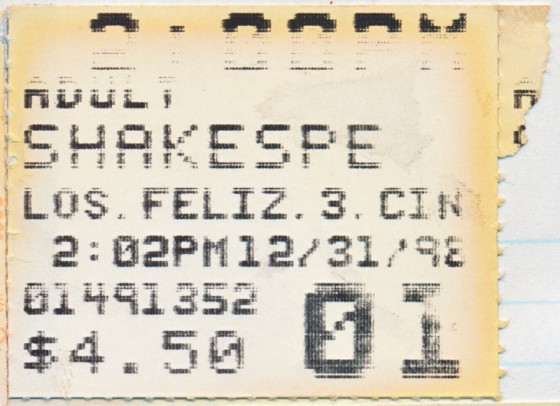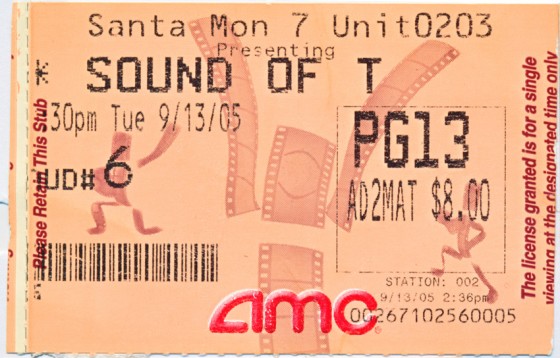Shakespeare in Love & A Sound of Thunder

Is this the end of Zombie Shakespeare 2: Dark Territory?
Since we’re on the subject of the Shakespeare fetish, I’m going to go way back, to 1998, and a film called Shakespeare in Love, which was a good movie.
I don’t mean that as a compliment.

When it comes to moviegoing, I’m looking for something memorable. Or, if it’s really hot, and there’s no air conditioning in the house, something long (this is why I saw Wyatt Earp. I don’t remember a single character, event or location, but I do know I was really cold in the Hollywood Galaxy 6 for 2 hours and 41 minutes plus trailers. That, and Michael Madsen probably should have picked Travolta’s part in Pulp Fiction over Virgil Earp. But who among us has a crystal ball? Wyatt Earp could have been HUGE!
Okay, that was uncalled for). But if it’s not hot outside, the priority list goes something like this.
1) Great movies
2) Spectacular failures
3) Terrible movies
4) Good movies
Great movies are more common than you’d think, and there are all kinds of subcategories, yet another future topic. There’s Sublime films (Vertigo, Stalker, Gilda), Perfect Narratives (Silence of the Lambs, Casablanca, Die Hard), Surrealist (Careful, eXistenZ), Unintentional Surrealist (Car 54, Where Are You?, Little Rascals), and Multiple Genre (Hudson Hawk). These are films that are a joy from start to finish, an album without a single bad track.
Now I was a little harsh on Synecdoche, New York earlier, which was a mistake. It was, after all, a spectacular failure, which is the second best kind of movie, a Digital Ash in Digital Urn to a Double Nickels on the Dime. I should have been kinder, but something so close, and yet incomplete, brings out, however unfairly, that feeling of being betrayed. Why, oh why, couldn’t you be perfect? Pilate’s the one we should really be mad at; it isn’t right that we hate Judas, but we do. And Benedict Arnold was just a British patriot. Don’t we like those guys now?
So, the final word on Synecdoche: had a great time. Sometimes bored, mostly happy. The same would go for a terrible movie, like Revolver, or In the Name of the King: A Dungeon Siege Tale or A Sound of Thunder.


As if the grammatically confused title wasn’t enough, you know that if you’re watching a movie where they invent time travel, and the only thing that Sir Ben Kingsley can think to do with it is to hunt dinosaurs, and there are time waves, you’re not going to be bored. The financiers took one look at the special effects for ASOT, deemed the film unreleasable, and did the only logical thing: released it anyway. You may forget your wife’s best friend’s birthday, you’ll never forget the sight Edward Burns ‘walking’ down a half finished 2080 Chicago street. If you think I’m lying, I have one word for you:
Hovercars!
A Sound of Thunder

$30.00
As for Shakespeare in Love, always, always bored. When it comes to good movies, I’m a child of the 21st Century (technically a child of the 20th Century, but I watch a lot of TV, so I got caught up), and so I’d rather be anything but bored. Make me happy, or angry, or sad, or anxious, or connected, or even confused; just don’t do nothing. This may seem shallow, but let’s be honest here. You’re sitting extremely still in a dark room watching stuff. At the very least you should be feeling something.


Which leads us to the Shakespeare fetish, part 2. For those of you that don’t remember, the story of Shakespeare in Love, involves Shakespeare using events in his own life to write the story for Romeo and Juliet. Now the story for Romeo and Juliet came from a 15th C. Italian novel, but my gripe isn’t that the film fails to be historically accurate. Since no one knows what really happened about anything, I’m not complaining when films ‘don’t get it right’. In fact, I prefer it. Since I’m retired from filmmaking, I’ll tell you the secret to making a biopic about The Minutemen (which should be called History Lesson, Part II, by the way): d. boon lives.

Best seat in the Los Feliz 3: Center, front row, theatre 1. Do not, under any circumstances, see a film in theater’s 2 or 3.
Shakespeare’s writing is about poetry and insight. His plots, on the other hand, they’re just a little silly. I mean, stabbing Polonius through the curtain? That seems a little forced, buddy. And Romeo not getting the note that Juliet wasn’t really dead? You’d think the Friar’d have a backup plan for that. It’s just weak, dude. No, if you want plot, check out Elmore Leonard or James Ellroy. If you want insights into human behavior expressed with precision, well, actually, Leonard and Ellroy are pretty good at that too, but Shakespeare may be even better.
But our Shakespeare fetish isn’t about his wit; it’s about his plots, about tragedy, about mistaking melancholy for depth. If Romeo and Juliet ends badly, so must Shakespeare in Love. They’re always making jokes about how Hollywood wants a happy ending at any cost, but it just makes those movies for the stupid audiences, all the while stockpiling money and cred for the legit films, which are as grim as real life, man.
Why should this be so? Maybe making happy movies leaves them so unfulfilled that they make bleak movies to reflect the unhappy reality where you get paid a lot of money to make happy movies. It’s also possible that they enjoy the happy movies, feel guilty about enjoying them, and so flagellate themselves with the important films, the ‘films that matter’. Whatever the reason, what filmmakers really like are bummers, and the critics help the whole process along by praising the films that fail, and criticizing the ones that succeed. Intellectuals love a downer because they equate being depressed with being smart. Let’s face it: intellectuals, they’re just not that bright.
I’m not trying to say that all movies should be happy or sad, just that movies should have the ending, middle and beginning that fits the situation, and that if the characters get what they want, we should still be allowed to take the film seriously.
Until that glorious day, here’s how to win an Oscar: make a movie that’s exactly the same as a regular movie and then give it a sad ending. That’s it. Make a romantic comedy where they don’t get together (Broadcast News, Shakespeare in Love), or where one of them dies (Titantic), or a thriller where the bad guy gets away (Silence of the Lambs, No Country for Old Men) and you’ll be bringing your date to the Kodak Pavilion in no time (not that I’ve ever dreamt about it, but I’d bring my mom. She was always a little fuzzy as to what I did for a living). And as you perambulate through the abomination that is the Hollywood/Highland complex, he or she will lean over and ask:
“They have the Oscars in a mall?”
Shakespeare in Love

-$24.00
The Lonely Comments Section

 [logo]
[logo]
